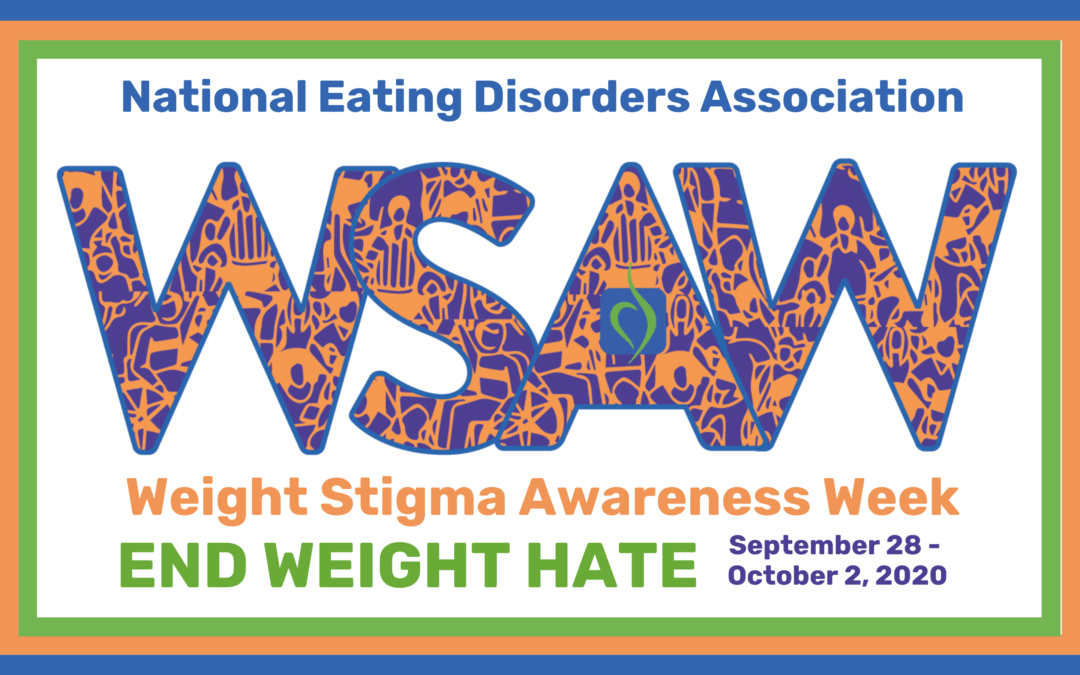Last year kicked off the very first Weight Stigma Awareness Week (WSAW) courtesy of the National Eating Disorder Association (NEDA). This September 28 through October 2, 2020 is the second annual awareness week to increase awareness of weight stigma.
Weight Stigma
Weight stigma has been around for years and it is encouraging to know that more and more attention is being placed on this, alerting our society to this issue and micro and macro aggression. NEDA pioneered this movement to draw attention to the various ways weight stigma impacts the eating disorder community and our society as a whole. According to NEDA, weight stigma, also known as weight bias or fat phobia is “discrimination or stereotyping based on a person’s size”.
If we look closely, examples of weight stigma are all around us. An example includes walking into a waiting room or lobby and not having a chair to sit in that accommodates your body. As you flip through your favorite catalog of outdoor gear, look at the individuals who are displayed, they are often in smaller bodies, athletic bodies, instead of demonstrating bodies of all shapes and sizes. Another example is attending a routine physical and your doctor nonchalantly comments on your weight and makes the suggestion that you should lose some weight, sending you out the door with a referral to a weight management clinic. Weight stigma is present in the healthcare world (paying more for insurance because you are larger bodied), transportation (paying more money for an airplane seat to accommodate your body), social media & social cultural influences (photos of women and men in athletic gear that are smaller bodied and do not display an accurate portrayal of society), within our relationships with others (the parent who comments on their daughter gaining the “freshmen fifteen), and in the various public settings (trying to go see a movie in the theater and not having a chair to sit in).
Weight Stigma and Eating Disorders
Weight stigma impacts the eating disorder community too. For too long, being thin has been glamorized and idealized, our bodies on display and left to be critiqued or applauded. Those who don’t “measure up” to this thin ideal or what society suggests is expected, are left with the message that something is wrong with their body, leading to feelings of shame (“there is something wrong with me”) and disappointment, which in turn can fuel an eating disorder or add more fuel to the fire of the already-developed eating disorder. Those individuals who are in larger bodies may not be referred to the appropriate treatment to address their problematic eating and/or eating disorder. For example, atypical anorexia shows up in larger body men and women, and because of this, they may not be screened/assessed for anorexia despite struggling with it, and thus not be able to access treatment.
Weight Stigma Awareness
We must increase our awareness, acceptance, and understanding. We can all do better. Stigma in the healthcare world can be a barrier for patients to get the help they actually need, as research has demonstrated that larger body individuals are less likely to seek preventative care. The healthcare world can seek understanding as to what their patient is experiencing, asking more thorough questions and actually screening for ED. Perhaps the patient sitting across from their doctor who has experienced weight gain is related to PCOS, not an inactive lifestyle, and if they leave that doctor’s office with a recommendation to go on a diet, instead of affirmation, understanding, and validation, that individual could quickly find themselves struggling with dieting and feelings of discouragement.
We also must be conscious of the comments we as a society tend to make. For example, for too long we have carelessly commented on the size and shape of another’s body. The mom who just had a baby and has lost her baby weight is praised with a “WOW! You look amazing” when in reality, she has had many sleepless nights, difficulties finding the time to eat, resulting in the weight loss. Or the comments that have been thrown around in the last six months referencing COVID-19 weight gain, and how insensitive this is to the individual who is experiencing the grief, loss, and anxiety that the global pandemic has ushered into their life.
Let’s shift the way we discuss other people’s bodies. Let’s be more aware that our words have weight to them. We can encourage the world of marketing to actually display shapes of all sizes. When someone is commenting on the holiday weight gain, redirect the conversation. Write to insurance companies about the higher premiums for larger body individuals and advocate for inclusivity. Incorporate a Health At Every Size (HAES) approach that focuses on health behaviors outside of weight and believes strongly in advocating for people of all sizes. If you would like more information, please check out NEDA’s webpage on Weight Stigma Awareness Week.

